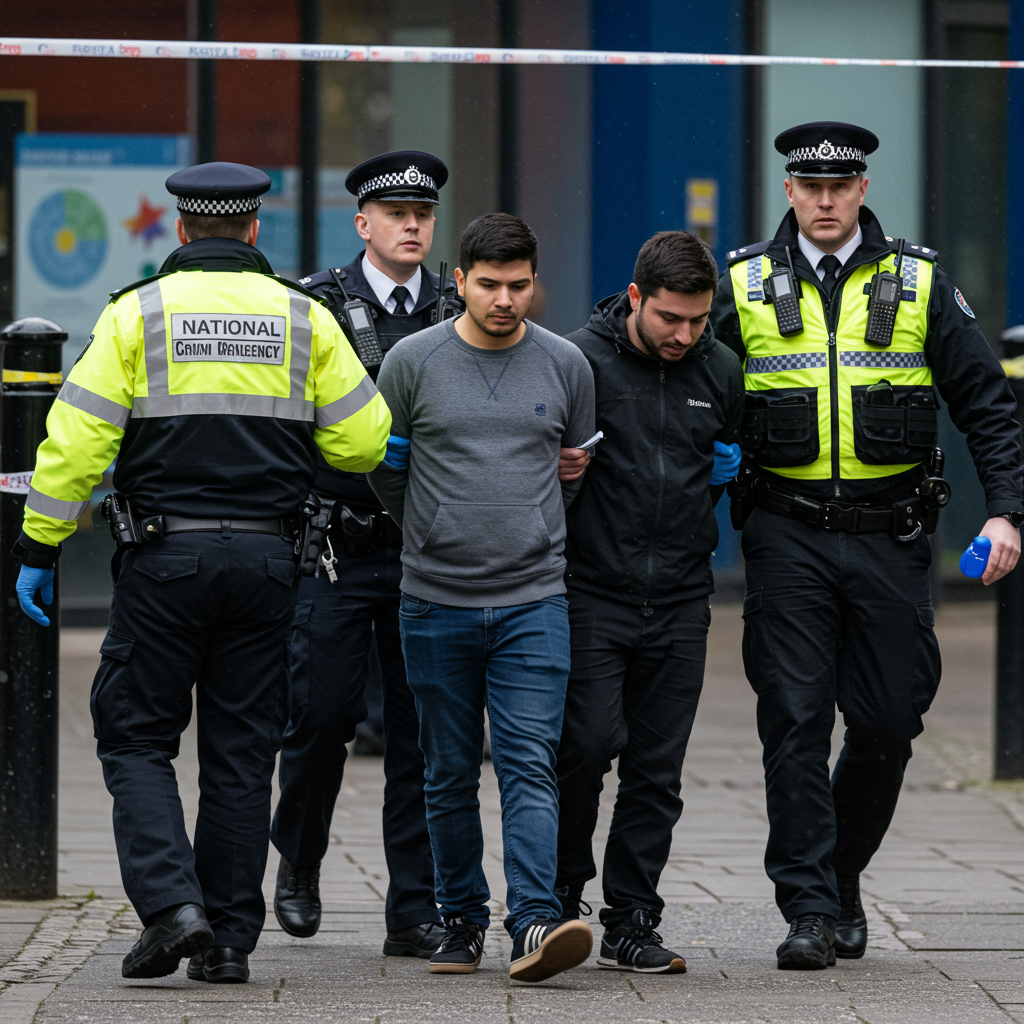A significant development has unfolded in the investigation into the disruptive cyber attacks that recently plagued major UK retailers M&S and the Co-op. Authorities have taken four individuals into custody in connection with the widespread online intrusions that caused extensive operational issues and substantial financial damage.
The National Crime Agency (NCA) announced the arrests occurred during coordinated early morning operations on Thursday. These operations were carried out at residential properties across different parts of England. Electronic devices were seized from the suspects’ homes as part of the ongoing probe.
Major Breakthrough in Retailer Cyber Attack Investigation
The four individuals arrested comprise a 20-year-old woman detained in Staffordshire and three males aged between 17 and 19 who were apprehended in London and the West Midlands. This group includes three British nationals and one Latvian individual. The arrests represent a crucial step forward for investigators.
All four suspects face serious allegations. They were arrested on suspicion of offences under the Computer Misuse Act. This legislation covers a wide range of illegal online activities, including unauthorized access to computer systems. Additionally, they face suspicion of blackmail and money laundering. These charges suggest a potential attempt to extort money from the affected companies and handle illicit funds. Furthermore, the suspects are suspected of participating in the activities of an organised crime group, indicating authorities believe the attacks were not isolated acts but part of a coordinated effort.
Details of the Arrest Operations
Neighbours of the Staffordshire address where the 20-year-old woman was arrested described a notable police presence. Dozens of NCA officers were reportedly involved in the operation. Some officers were seen wearing balaclavas during the early morning action. Witnesses reported seeing officers force entry into a family home. Later, investigators were observed removing numerous electronic devices from the property. This suggests a focused effort to gather digital evidence crucial to the case.
Paul Foster, head of the NCA’s National Cyber Crime Unit, commented on the arrests. He stated that they mark a “significant step” in the agency’s investigation. Foster emphasized, however, that the work is far from over. He confirmed that authorities are continuing their efforts. This includes collaboration with partners both within the UK and internationally. The goal is to identify all those responsible for the attacks. Authorities are determined to ensure they are brought before justice.
The NCA operation received support from other law enforcement bodies. Officers from the West Midlands Regional Organised Crime Unit assisted. The East Midlands Special Operations Unit also provided support. This collaborative approach highlights the complex nature of modern cybercrime investigations.
Timeline and Impact of the Devastating Cyber Attacks
The wave of cyber attacks began causing disruption in mid-April. They significantly impacted the operations of multiple retailers. M&S was the first major target to publicly report issues. This initial breach had severe consequences. A substantial volume of private data belonging to both customers and staff was stolen. This type of data theft poses significant risks to individuals, including potential identity theft and fraud.
Beyond data theft, the criminals deployed malicious software. This software is known as ransomware. Ransomware encrypts a company’s IT networks. It makes them unusable unless a payment, or ransom, is made. The BBC reported that the hackers allegedly sent an “offensive email” to the M&S boss demanding payment. This tactic is typical of ransomware attacks. M&S has estimated the financial cost of the attack to be around £300 million in lost profits. The company expects operational disruptions to persist until late July. Some IT systems may not be fully functional until as late as October or November. The chairman of M&S conveyed the severity of the situation to MPs. He stated that the attack felt like an attempt to “destroy the business.”
A few days after the M&S breach, the Co-op also fell victim. Criminals successfully infiltrated their systems. They managed to steal private data. Millions of customers and staff were affected by this data breach. Initially, the Co-op appeared to downplay the incident’s severity. However, the situation changed when hackers contacted the BBC. They provided proof that contradicted the company’s public statements. This forced the Co-op to fully acknowledge the extent of the data breach.
Averted Ransomware at the Co-op
Further details emerged about the Co-op attack. The BBC later learned information directly from the criminals. According to the hackers, the Co-op took decisive action. The company disconnected its IT networks from the internet. This happened just in time. This quick thinking prevented the hackers from deploying ransomware. Had the ransomware been deployed, it would have caused even greater disruption to the Co-op’s operations.
Shortly after the Co-op disclosed its attack, luxury retailer Harrods also reported being targeted. Harrods stated the impact on its operations was less severe compared to M&S and the Co-op. Nevertheless, Harrods also had to take protective measures. The retailer disconnected its IT systems from the internet. This was done specifically to keep the criminals out.
These incidents highlight a growing threat. Retailers and supply chains are increasingly vulnerable to sophisticated cyber attacks. Such attacks can cripple operations and compromise sensitive data. The involvement of an alleged organised crime group suggests a planned and targeted approach.
The Significance of These Cyber Crime Arrests
The arrests are considered a key milestone in the investigation. They indicate significant progress in identifying those potentially responsible. The young age of the suspects (17-20) aligns with previous suggestions. Detectives had previously indicated that the hackers might be young individuals. Earlier speculation even included potential suspects from the US and UK. The arrests confirmed UK and Latvian links among the apprehended individuals.
The charges faced are comprehensive. They cover the unauthorized digital intrusion (Computer Misuse Act). They also include the potential financial motives (blackmail, money laundering). The organised crime element is particularly noteworthy. It suggests a level of structure and coordination behind the attacks. This is characteristic of more sophisticated cyber threats.
Investigators will now focus on the evidence seized. Electronic devices like computers and phones are critical in cyber crime cases. They often contain logs, communications, and malicious tools used in attacks. The NCA’s statement underscores the ongoing nature of the work. Identifying and prosecuting all involved parties requires extensive digital forensics and international cooperation.
These arrests serve as a stark reminder. Businesses of all sizes face constant cyber threats. The disruption at major retailers demonstrates the potential consequences. This includes massive financial losses and prolonged operational recovery. The investigation continues to bring all perpetrators to justice.
Frequently Asked Questions
What specific charges do the arrested individuals face in the M&S/Co-op cyber attack case?
The four individuals arrested are facing serious charges. They have been apprehended on suspicion of offences under the Computer Misuse Act. This includes unauthorized access and potential damage to computer systems. They are also suspected of blackmail, indicating an attempt to demand money from the victims. Furthermore, they face suspicion of money laundering related to handling any illicit funds. Finally, they are suspected of participating in the activities of an organised crime group, suggesting the attacks were part of a planned operation by a collective.
Where did the arrests in the M&S and Co-op cyber attack investigation take place?
The arrests were conducted during coordinated operations across different regions of England. A 20-year-old woman was arrested in Staffordshire. Three males, aged between 17 and 19, were detained in London and the West Midlands. These early morning operations were carried out at the suspects’ homes. The National Crime Agency (NCA) led these operations, with support from regional police units in the West Midlands and East Midlands.
How did the cyber attacks impact retailers like M&S and the Co-op?
The cyber attacks caused significant disruption for both retailers. M&S suffered extensive data theft affecting customers and staff. The attackers also deployed ransomware, which crippled IT networks. M&S anticipates operational impacts lasting until late July and some IT systems possibly not fully functional until October or November. The company estimated a £300 million loss in profits. The Co-op also experienced a large-scale data breach affecting millions. While targeted with ransomware, the Co-op managed to disconnect its network just in time, preventing its deployment and averting further chaos. Harrods was also targeted but reported less impact, also disconnecting systems as a precaution.
Conclusion
The arrest of four individuals marks a significant breakthrough in the complex investigation into the cyber attacks on M&S, Co-op, and Harrods. These attacks caused widespread disruption, data breaches, and substantial financial losses for the affected retailers. While these arrests are a crucial step, authorities emphasize that the investigation is ongoing. The NCA, working with domestic and international partners, continues its efforts to ensure all those responsible for these sophisticated attacks are identified and held accountable. This development underscores the persistent threat cybercrime poses to businesses and the importance of robust security measures.




